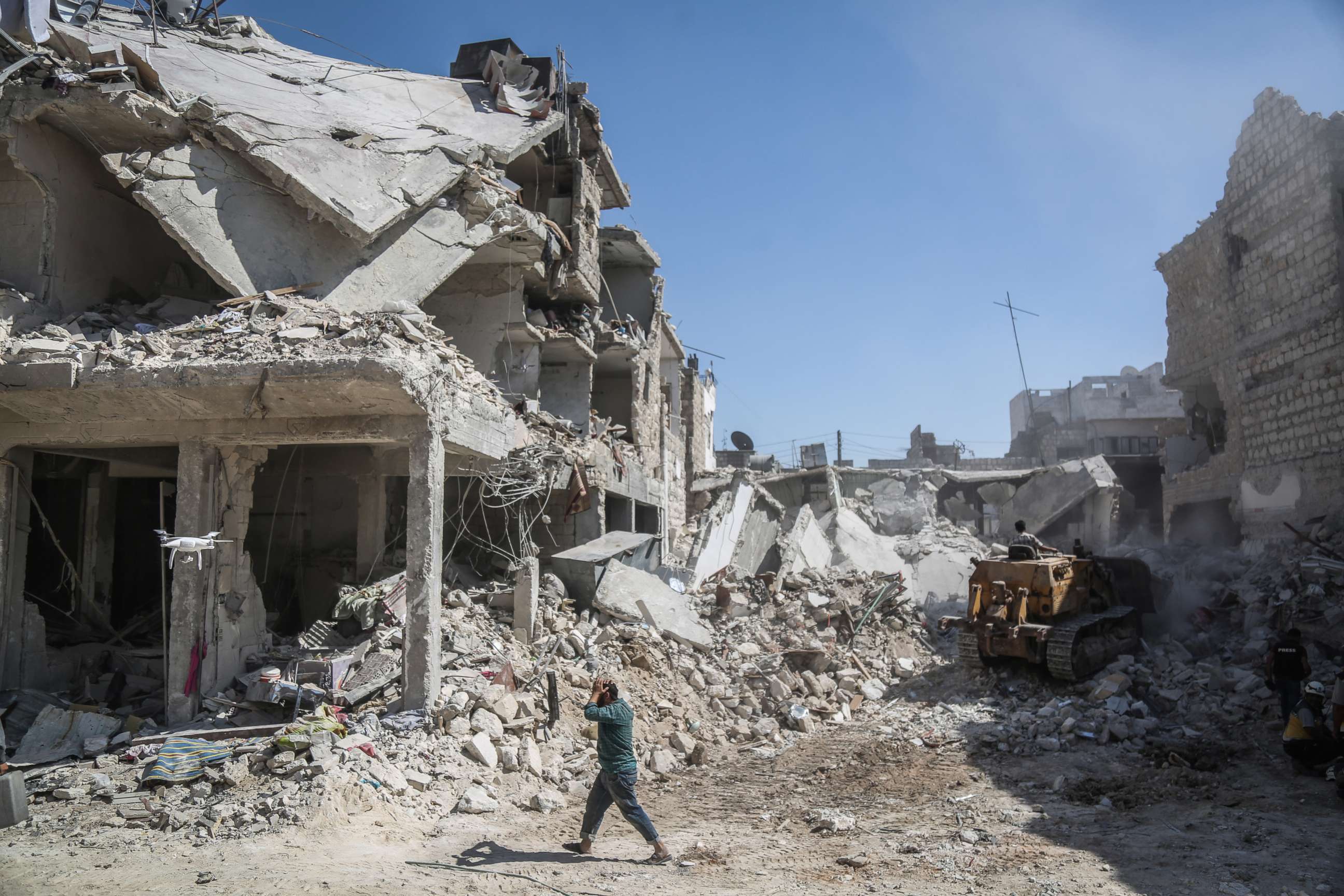Trump administration may end protected status for Syrians, leaving many fearing 'a death sentence'
The administration is expected to announce a decision Thursday.
Monzer Shakally was 16 years old when he joined the protests in the streets of Damascus, was arrested and tortured by the Syrian government, and, once released, escaped to find safe haven in the U.S.
Now 23, and entering his second year of dental school in Iowa City, Shakally must wait on edge as the Trump administration possibly terminates his legal status.
The administration is considering ending legal status for Shakally and approximately 7,000 other Syrians living in the U.S. -- a move that would force them to find a new legal status, leave the U.S. or even face deportation to Syria.

"The anxiety and uncertainty that is there in the back of your mind at all times is stressful. Over time, it's difficult to live with," Shakally told ABC News.
Temporary Protected Status is a temporary legal status given to immigrants who entered the U.S. legally and remained here continuously so they can stay and work. It is granted by the Department of Homeland Security to recipients from countries plagued by war, environmental disaster or other extraordinary and temporary conditions. It's intended to remain in place until those conditions improve.
U.S. Citizenship and Immigration Services, which administers the program inside DHS, did not return a request for comment on whether the administration will renew TPS for Syria.
But the Trump administration has to make a decision by Thursday, 60 days before TPS for Syria is set to expire on Sept. 30. In January, the Trump administration announced it had extended TPS for 7,000 Syrians already in the country, but Syria was not "redesignated," so Syrians who came to the U.S. after August 2016 could no longer apply.

That distinction has several activists and Syrian recipients worried that this time around the White House will move to fully terminate the program.
Syria was first designated for TPS in March 2012, one year after mass protests swept across the country and were met with a brutal crackdown by President Bashar al Assad's government. The chaos of the resulting civil war has mutated into a proxy battle and counterterrorism campaign, with Turkey, the U.S., Russia, Iran and other regional countries and terror groups like ISIS, al Qaeda and others all involved.
"Going back would be literally a death sentence," said Michael Shakur, 26, a stand-up comedian from Aleppo who now lives in New York. Shakur described the sniper fire, kidnappings, airstrikes and gunfire fights that all happened outside his family's home while they hid in an interior stairwell.
"This country really just saved my life," he said of the U.S. "I am grateful for being given the chance to live, to exist, to have a future, to have a life, to do things I'm passionate about. ... That's what TPS is."

But now, with a possible termination pending, the unknown hangs over his and others' plans. Nada Odeh, an artist and art teacher in Syracuse, New York, said she's put off buying a house and has watched as the anxiety has affected her two teenage children also on TPS.
"We're not settled down. We're not able to know what's next," said Odeh, who left Damascus in 2012 after a colleague with whom she tried to provide donations to fellow Syrians displaced by the war was tortured to death. Six years after coming to the U.S., she heard her daughter and son say recently, "'Our lives suck. We don't know what we're doing' ... they are raised in this insanity."
Their futures are now partly in the hands of the new head of U.S. Citizenship and Immigration Services, Ken Cuccinelli. An immigration hardliner, Cuccinelli said earlier this month that even in cases of war or environmental disaster, the administration may not designate a country for TPS.
"Because TPS is discretionary, even if the Secretary determines that conditions meet one or more of the prongs for TPS, he or she may still decline to designate the country," he wrote in a letter to Sen. Dick Durbin, D-Ill.

His appointment has concerned advocates, as has the administration's track record on TPS. Despite difficult conditions that remain in each country, Trump has terminated most other TPS designations -- for El Salvador, Honduras, Haiti, Nepal, Nicaragua and Sudan -- that were repeatedly renewed by his predecessors George W. Bush and Barack Obama.
That has eliminated legal status for over 300,000 immigrants, including some that have lived in the U.S. for two decades. Approximately 57,000 Hondurans have had TPS since it was first granted in January 1999 because of a hurricane, while some 195,000 Salvadorans have had TPS since a 2001 earthquake.
Still, the situation in Syria is particularly dangerous, with some U.S. officials saying the risks have even increased in recent months with an escalation in fighting in the northwest and violent retaliation by the Assad regime against many Syrians who have returned. U.S. Ambassador Cherith Norman Chalet told the United Nations Security Council Tuesday, "There is no denying that the humanitarian situation in Syria is growing more dangerous by the day."
Even if the war were to end, many fear the government that seems likely to keep ruling the country.

"The Assad government is still the same government that existed before and existed during. ... There's going to be guaranteed arrests and tortures and possible kills. For me, I'm not going back to Syria," said Shakally. "That's like a death sentence for me."
For now, he and other Syrians are forced to consider other options, but they have limited choices. To apply for a U.S. visa, an applicant needs a valid foreign passport, but for many, their Syrian passports have expired and the Syrian government says they're unable to renew them without returning.
Many Syrians have also applied for asylum, given their fears of violent reprisal in Syria for their political views. But adjudication of those applications takes years. For Shakally and Shakur, their applications are pending, but TPS could be stripped before they get an answer.
"Every year creates this limbo of uncertainty, of like, will I be able to have a future?" Shakur said. "It seems silly to plan for a future where you're not sure you're going to be there."



